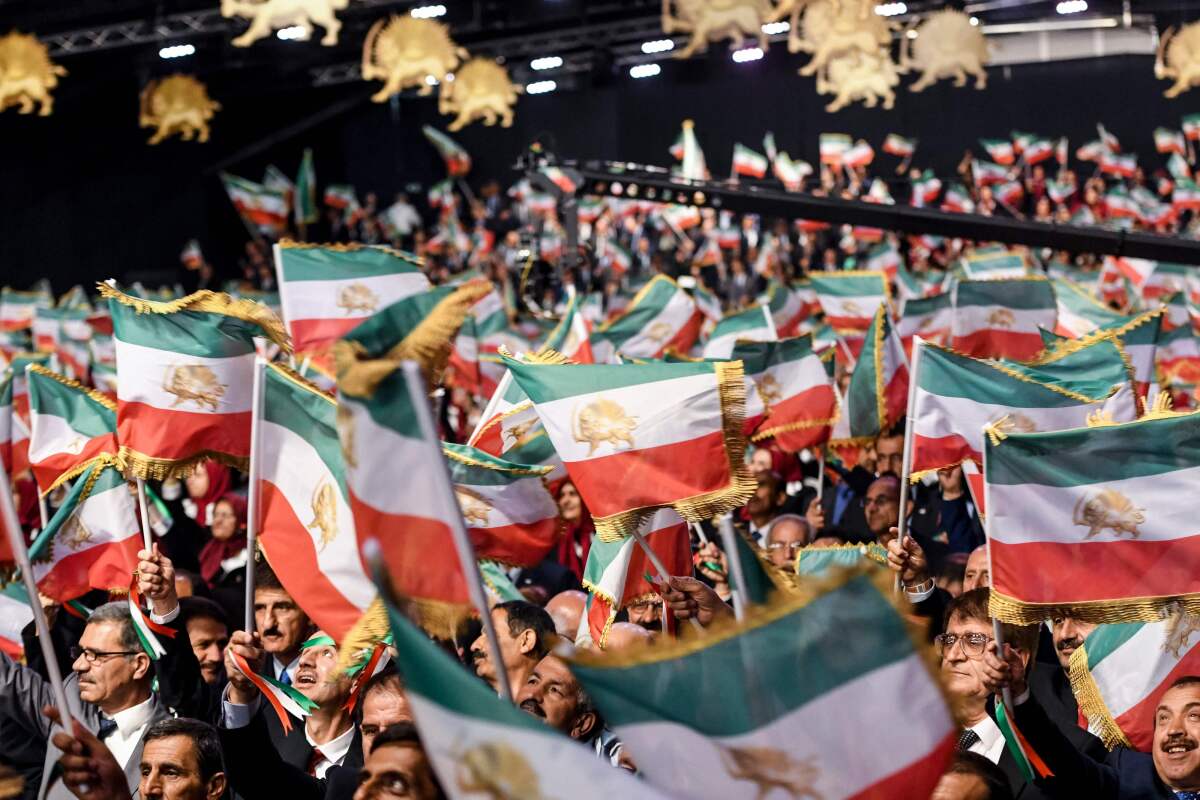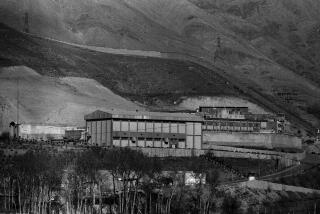This Iranian opposition group was labeled a terrorist organization. Now it has supporters in the White House

- Share via
For decades, the United States categorized the Mujahedin Khalq, or MEK, as a terrorist organization. In the Trump era, members of the Iranian dissident group, which seeks to topple the government in Iran, have found key allies in Washington.
People close to President Trump, including national security advisor John Bolton, and Trump’s personal lawyer, Rudolph W. Giuliani, are supporters of the Mujahedin Khalq. For years, Bolton and Giuliani have called for a change of government in Tehran and have described the Mujahedin Khalq as a viable alternative to the government of the Islamic Republic.
This month, Giuliani appeared at a Mujahedin Khalq conference in Albania, where he gave a speech condemning the Islamic Republic and described the group as a “government in exile.”
“This is a group that we can support. It’s a group we should stop maligning and it’s a group that should make us comfortable having regime change,” Giuliani said to a cheering audience.
During a 2017 Mujahedin Khalq conference in Paris, Bolton told a room filled with its members that U.S. policy should be “the overthrow of the mullahs’ regime in Tehran.”
He added, “There is a viable opposition to the rule of the ayatollahs and that opposition is centered in this room today.”
Both Giuliani and Bolton have received tens of thousands of dollars from the group in exchange for speaking at its rallies and conferences.
Founded five decades ago by leftist students in Iran who opposed the Western-backed monarchy of Mohammed Reza Shah Pahlavi, the Mujahedin Khalq is an insular organization with a militant past. Many Iranians despise the group and from 1997 to 2012, it was on the U.S. State Department’s list of terrorist organizations in part because of its bloody attacks in the 1970s that left American diplomats and businessmen dead.
The Mujahedin Khalq and its supporters claim that the group stands for a free and democratic Iran and that its decades-long struggle has helped make it the most qualified opposition group. But critics and human rights organizations describe the group as a cult, and many lawmakers and State Department officials don’t believe it has popular support or influence.
The group has a history of networking with U.S. politicians on both ends of the political spectrum.
“Different people come and go with each administration. We’ve had the same position and demands over the years no matter who is in the White House,” said Alireza Jafarzadeh, deputy director of the National Council of Resistance of Iran, a Mujahedin Khalq-linked group based in Washington.
But despite its continued lack of support among many in Washington, the Mujahedin Khalq feels emboldened now that tensions with Tehran have escalated and it has key supporters who have Trump’s ear. “I can’t recall in the past 40 years seeing such a two-year period where there’s been lots of developments shaping Iran,” said Jafarzadeh.
***
The Mujahedin Khalq, founded in the early 1960s by husband-and-wife team Massoud and Maryam Rajavi, carried out a series of terrorist attacks during the 1970s against Iran in which several U.S. military personnel and civilians who were working on defense projects in Tehran were killed, according to a 1994 U.S. State Department report.
The group also helped the country’s Shiite Muslim clerics topple the shah during the 1979 revolution. But it didn’t take long before the newly formed conservative theocracy headed by anti-Western Ayatollah Ruhollah Khomeini came to view the Mujahedin Khalq as a rival.
About 2,000 members of the group relocated to Iraq during the 1980s.
In addition to providing shelter, then-Iraqi President Saddam Hussein armed the group with heavy military equipment. During the Iran-Iraq war, its members teamed with Baghdad in an attempt to take down the Islamic Republic. Iraq remained a safe haven for the Mujahedin Khalq for nearly two decades.
Throughout that time, the group continued to launch attacks inside Iran and on its embassies abroad. The State Department described the Mujahedin Khalq in its 1994 report as “the single most violent underground group” in Iran.
“Shunned by most Iranians and fundamentally undemocratic,” the report said, the Mujahedin Khalq is not “a viable alternative to the current government of Iran.”
U.S. relations with the group, however, grew complicated after the American-led invasion of Iraq in 2003.
Although the group disarmed and was confined to Camp Ashraf, a 14 square-mile former Iraqi military base , the new Iraqi government wanted its members to leave. Faced with a potential humanitarian crisis, officials in Washington sought to find the Mujahedin Khalq a new home.
Daniel Benjamin, the State Department counter-terrorism coordinator under then-President Obama, said that was a factor in removing the Mujahedin Khalq from its list of foreign terrorist groups.
“All these people were the subject of violence, that’s what really caused the U.S. to look at the issue ... to avoid a humanitarian catastrophe,” Benjamin said.
Eventually the U.S. brokered a deal with the government of Albania.
“The Albanian government basically wanted reassurance that they weren’t a terrorist group. I didn’t promote them as an ideal group but they didn’t deserve to be slaughtered,” said Daniel Fried, who was tasked by then-Secretary of State Hillary Clinton to find a country that would accept Mujahedin Khalq members.
Their future looked grim up until after the presidential election in 2016, when Trump’s “maximum pressure campaign” on Iran became American policy.
Already, several policies that the Mujahedin Khalq had long advocated for, such as designating Iran’s Revolutionary Guard as a terrorist group and placing U.S. sanctions on Iranian Supreme Leader Ayatollah Ali Khamenei, have been implemented under Trump.
“This administration sees ‘the enemy of my enemy as my friend.’ So any organization that opposes that Islamic Republic is fine by them,” said Barbara Slavin, the head of the Future of Iran Initiative at the Atlantic Council. “The administration knows it makes the Iranian government crazy. It sends a message of animosity.”
***
But the extent to which the Mujahedin Khalq can gain stronger credibility in Washington — even during the Trump administration — remains uncertain.
“The MEK has American blood on its hands. No serious observer or scholar of the region that I’ve met has thought that the MEK was remotely acceptable to any significant percentage of the Iranian people,” Benjamin said.
And in recent months some officials in the Trump administration have taken steps to distance it from the Mujahedin Khalq.
In April, Secretary of State Michael R. Pompeo met privately with a small group of Iranian Americans in Dallas. Michael Payma, an attorney, was one of those people invited to attend the roughly hourlong conversation.
“Pompeo said he knows Giuliani and Bolton have had some kind of relationship with the MEK, but he made it clear that neither him nor the president have any association with the group,” Payma recalled.
In June, Brian Hook, U.S. special representative for Iran, reiterated those points when he told reporters that the State Department meets with all members of the Iranian diaspora and that the future of Iran will be decided by its people, not the United States.
“We have been, I think, zealously neutral with respect to groups who all care very much about the future of Iran, and that’s going to be something which the people of Iran decide for themselves,” Hook said.
Regardless, Washington’s cozier relations with the Mujahedin Khalq has Tehran concerned.
In recent years, there has been an uptick in attacks against the group by Iran. Two Iranian suspected of surveilling the Mujahedin Khalq were arrested in Albania in 2018, and an Iranian diplomat in Vienna was arrested on suspicion of plotting to bomb a Mujahedin Khalq rally outside Paris.
Nader Karimi Juni, a Tehran-based analyst, said Iran is on edge because the Mujahedin Khalq has members and supporters in positions of power in the U.S. and Europe.
“Iran has good reason to regard the MEK as a threat,” Juni said.
Special correspondent Ramin Mostaghim in Tehran contributed to this report.
More to Read
Sign up for Essential California
The most important California stories and recommendations in your inbox every morning.
You may occasionally receive promotional content from the Los Angeles Times.











